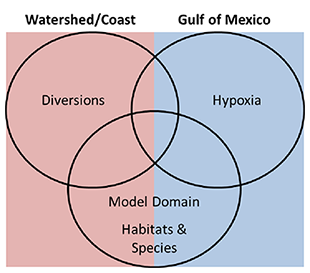Last month’s Fifth Annual Gulf of Mexico Hypoxia Research Coordination Workshop continued its tradition of advancing the science that informs fisheries and resource managers about the effects of Gulf hypoxia (low dissolved oxygen). The workshop also provided a forum to assess and predict the potential ecological and socioeconomic effects of Mississippi River diversions.
Large-scale ecosystem restoration efforts such as river diversions and hypoxia mitigation will affect fisheries and their habitat. The ability to assess and predict these effects is important in ensuring that restoration management is informed by the best available science and that decision-making can adjust to advances in understanding ecosystem responses (i.e., ‘adaptive management’). The workshop gave federal, state, NGO, and academic managers and researchers an opportunity to chart a course for adaptive management in the Gulf.

Attendees emphasized the need to include the ‘human element’ in assessing ecosystem effects by integrating social and economic sciences with ecosystem modeling. Workshop proceedings will inform the production of an Ecosystem Modeling Adaptive Management Framework for advancing ecosystem modeling of hypoxia and diversion effects on fisheries in the northern Gulf of Mexico.
The workshop – held at the John C. Stennis Space Center in Mississippi – was supported and organized by NCCOS, hosted by the Northern Gulf Institute, and additionally sponsored by NOAA’s National Marine Fisheries Service, National Ocean Service, and Gulf of Mexico Regional Collaboration Team, as well as the Environmental Protection Agency’s Gulf of Mexico Program and the Restore the Mississippi River Delta Coalition.
For more information, contact David.Kidwell@noaa.gov.
